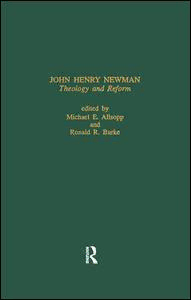
John Henry Newman: Theology and Reform PDF
Preview John Henry Newman: Theology and Reform
JOHN HENRY NEWMAN GARLAND REFERENCE LIBRARY OF THE HUMANITIES (VOL. 1475) JOHN HENRY NEWMAN Theology and Reform edited by Michael E. Allsopp and Ronald R. Burke First published 1992 by Garland Publishing, Inc. Published 2018 by Routledge 2 Park Square, Milton Park, Abingdon, Oxon OX14 4RN 52 VanderbiltAvenue, New York, NY 10017 Routledge is an imprint of the Taylor & Francis Group, an iriforma business Copyright© 1992 Michael E. Allsopp and Ronald R. Burke All rights reserved. No part of this book may be reprinted or reproduced or utilised in any form or by any electronic, mechanical, or other means, now known or hereafter invented, including photocopying and recording, or in any information storage or retrieval system, without permission in writing from the publishers. Notice: Product or corporate names may be trademarks or registered trademarks, and are used only for identification and explanation without intent to infringe. Library of Congress Cataloging-in-Publication Data John Henry Newman : theology and reform / edited by Michael E. Allsopp and Ronald R. Burke p. cm. - (Garland reference library of the humanities ; vol. 1475) " ... papers presented originally at the ... Newman Centennial Con- ference, held at Creighton University, 18-20 October 1990"-Preface. Includes bibliographical references and indexes. ISBN 0-8153-0384-X (alk. paper) 1. Newman, John Henry, 1801-1890---Congresses. 2. Theology, Doctrinal-History-19th century-Congresses. 3. Catholic Church- Doctrines---Congresses. I. Allsopp, Michael E. II. Burke, Ronald R. III. Series. BX4705.N5J635 1992 230' .2'092-dc20 92-21667 CIP ISBN 13: 978-0-8153-0384-8 (hbk) ISBN 13: 978-1-138-88032-0 (pbk) Dedication In Memory of Rev. Anthony P. Weber, S.J. (1921-1990) * * * "Give me your love and your grace, for this is sufficient for me.' CONTENTS Preface ..............................................................................................ix Acknowledgments ............................................................................xi Introduction.......................................................................................xiii Madeleine Kisner, AS.C. NEWMAN, THE CHAMPION OF TRUTH............................ . 3 Ronald Burke NEWMAN, LINDBECK AND MODELS OF DOCTRINE ... 19 Edward E. Kelly ATHEISM OR CATHOLICISM: Stark Disjunction From Complex Newman.................................. 45 David G. Schultenover, S J. GEORGE TYRRELL: Devout Disciple of Newman.......................................................... 57 Philip C. Rule, S.J. GROWTH THE ONLY EVIDENCE OF LIFE: Development of Doctrine and The Idea of a University ............................................................... 87 Paul G. Crowley, S .J. THE SENSUS FIDELIUM AND CATHOLICITY: Newman’s Legacy in the Age of Inculturation........................... 109 Bernard J. Mahoney NEWMAN’S CONSCIENCE: A Teleological Argument.............................................................. 131 Francesco Turvasi THE DEVELOPMENT OF DOCTRINE IN JOHN CARDINAL NEWMAN AND ALFRED LOISY___ 145 vii viii John Henry Newman Martin X. Molcski, S J. ILLATIVE SENSE AND TACIT KNOWLEDGE: A Comparison of the Epistemologies of John Henry Newman and Michael Polanyi............................... 189 John R. Connolly NEWMAN ON THE CRITICIZABILITY OF CATHOLIC FAITH ............................................................ 225 Gerard Magill IMAGINATIVE DISCERNMENT: Newman’s Safeguard of Faith and Morals.................................. 241 Contributors ...................................................................................... 257 Index.................................................................................................... 259 PREFACE This collection of papers grew out of a concern of several at Creighton University for the perduring nature of the thought of John Henry Cardinal Newman. Although Cardinal Newman died some one hundred years ago, his influence on today’s thinking is still strong. Like Sir Thomas More with his Utopia, Newman put forward an ideal of society and life which has a recognizable relation to the lasting possibilities open to humankind. Whether Newman is seen variously as a reformer, or a mind fundamentally Catholic and constitutionally Protestant, or one thrown among strangers, or even a point of reference in a troubled world, there is no doubt that he was not only alive to the problems of his age in Church and society, but that he continues to inspire, to uplift and to enlighten us today. The editors and paper contributors of this volume have been brought together by a common interest in a man for whom the continual search for truth is paramount. Cultivation of the intellect, which Newman considered to be the necessary and sufficient end of education, was also the critical ability needed to be able to withstand the spread of opinions and values he believed to be greatly inadequate to the human condition. It is that critical ability that gives his analyses an uncanny contemporary relevance to issues of faith and life and their public significance, and what many contemporaries call the "privatizing" of religion. Following Newman, Jan Walgrave, O.P., has said that the proper excellence that a good intellectual training should impart to the mind is a keen and subtle power of openness, flexibility, and comprehension. To be able to enter into a different pattern of thought, to understand its point of view, to distinguish its principles, to see its consequences, to judge its lack of consistency within the perspective of its own view, to criticize it from within, to identify with its spirit and method without losing a sense of objective distance, is the basis of real dialogue. Indeed, one gets the impression that Newman did not fear the encounter of another, nor did he ever fear to encounter another. To such courage were joined an evangelical patience and wonderful modesty. For he knew that he was only cooperating in what was, after all, God’s work. He not only stood firm for a certain intellectual integrity, but also for a freedom of mind, which would not neglect that superior capacity to understand all that is human, which is the prime condition IX
